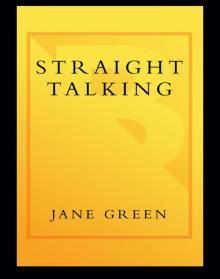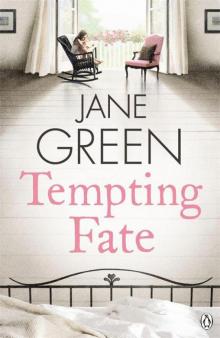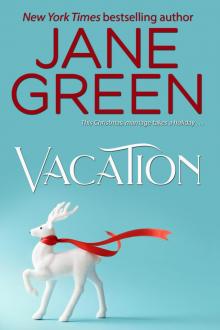- Home
- Jane Green
This Christmas Page 2
This Christmas Read online
Page 2
“Daddy!” Walker pleads. “You’re not looking.”
Before Walker can react Maggie comes in and snatches the web shooter out of Walker’s hands, running off into the kitchen with it. Walker starts screaming, Maggie hides behind Sarah’s legs, and Eddie explodes.
“Can’t a man get any peace and quiet around here!” he shouts. “Sarah, for God’s sake, tell them to keep it down.”
“Why don’t you tell them to keep it down?” Sarah snaps, picking up Maggie, who’s now crying because Walker is trying to prise the web shooter out of her little hands. “Walker! Leave her alone!” Walker wails louder now at the unfairness of always being blamed just because he’s the oldest.
“It’s my web shooter, Mommy! Maggie took it!” Maggie smirks and holds the web shooter triumphantly above her head as Walker screams.
“Upstairs, both of you!” Sarah shouts, putting down Maggie, who instantly starts wailing, while Walker successfully manages to rip the web shooter away and run upstairs.
“Goddamnit!” Sarah hisses to Eddie, pausing to take in the fact that he’s sitting back, his feet up, ignoring the screams from upstairs.
Sarah shakes her head. Get off your fat ass you lazy pig and help me, she thinks. Then, that’s it, fat boy, as he cracks open another beer. You just sit there like a slob while I do all the work, but of course she doesn’t say any of it. Once it’s out there it can never be taken back, and even though Sarah’s antipathy toward her husband is slowly turning into hate, there are some places she just won’t go.
Later that night Sarah climbs into bed with her book and pretends to be engrossed as Eddie comes to bed. He’s always slept naked, and in the early days she used to love how free he was about his body, how he used to tease her about always wearing a long T-shirt, but now she just tries to avoid looking at him, tries to lose herself in her book to stop thinking about how they became quite so unhappy.
Eddie clambers into bed and reaches out to turn off his overhead light. “Night,” he mumbles, as he turns his back to a grateful Sarah.
“Night,” she says disinterestedly. Long after he turns off the light and is gently snoring Sarah lies with her guilty thoughts. She thinks of something terrible happening to Eddie, something tragic and terrible that would take the decision out of her hands.
Not death, not necessarily, but maybe he would leave, fall in love with his secretary, announce it was over. She looks over at the back of his head with resignation. This is a man who can barely muster the energy to change television channels, let alone leave her. He’s never going to leave.
Sarah lets out a long, dissatisfied sigh and lays her book down. Maybe it will all feel better in the morning.
Chapter Two
“But you said you’d be home tonight by six,” Sarah sighs. “It’s book club tonight and I’m hosting. How am I supposed to get the kids fed and into bed, and get book club ready?”
“What can I do?” Eddie snaps. “It’s work. I didn’t plan a five o’clock meeting but I can’t turn it down. I don’t want to go over this again, Sarah. What do you want me to do? Leave? You want me to leave? You want me to get a job locally? Sure, I could get some lousy-paying job in a local firm and we’d have to move to a much smaller house but I don’t care. If that’s what you want, say so.”
Sarah grits her teeth and squeezes the phone, frustration rendering her speechless. “Forget it,” she says. “Fine.”
“I’ll grab something to eat in the city,” Eddie continues. “Seeing as you’ve got book club. I’ll see you later.”
Sarah nods silently and puts down the phone.
Before they had children Sarah and Eddie were not big believers in television. Before they had children Sarah and Eddie had many different beliefs about child rearing and parenting, beliefs that would make them, unequivocally, the best parents in the whole history of parenting. Ever.
They would never use the television as a baby-sitter, Sarah remembers saying, when Walker was only two years old and she had come back from a harassed play date where the mother had put the television on for everyone to get some peace and quiet toward the end of the day.
Sarah had been horrified. “We’d gone there to play!” she’d said in horror to Caroline. “Not to watch television. I had to take Walker home.”
So Sarah and Eddie had vowed never to use television as a baby-sitter. They’d looked at one another firmly and said they would never use sugar to calm a child down, would never raise their voices to their children, and would treat their children with kindness and respect.
At 5:30 Sarah runs into the family room to find Walker screaming as Maggie disappears behind the sofa with an evil grin on her face. Sarah’s heart plummets. How can this three-year-old who looks so angelic be such an unbelievable handful? Walker is her mama’s boy. Sweet, gentle, and sensitive, he’s always been a good boy, always done exactly what he’s been told, and if he has any fault at all it’s that he’s too sensitive, that he has a tendency to collapse, like now, in tears, at the slightest thing.
Walker never had the terrible twos, a fact she and Eddie put down privately, and horribly smugly, as the result of being such amazing parents. They have had to reconsider with Maggie; Maggie who displayed such extraordinary stubbornness and willfulness since the day she was born.
Even when she was a baby, when Maggie decided she wanted something, she would exert what Eddie called the death grip until whoever was holding it—usually Walker—had to let go.
“My girl’s a winner.” Eddie would smile proudly, and Sarah would shake her head as she comforted a crying Walker, wondering whether all girls were inherently more evil, or whether it was just her daughter.
Sarah pulls Maggie out from behind the sofa, a wriggling monkey who tries to writhe out of Sarah’s grip.
“Maggie, what have you got?” Sarah says sternly. She then turns to Walker and shouts, “Be quiet, Walker! Stop crying.”
“Nothing,” Maggie says, little fingers clutched tightly around something.
“No!” Walker wails, before dissolving in hysteria.
“Walker! Be quiet or you’ll go upstairs to your room. Maggie, give it back to him or you will get a smack.” Maggie keeps her fingers tightly closed until Sarah manages to pry them open, to find Walker’s favorite Power Ranger there.
“Here you are, Walker.” She gives it back to him, then says, “Oh, for God’s sake, will you now stop crying? Maggie, do not take Walker’s toys!” she berates, but even as she says those words she knows they’re having no effect.
For Maggie has no fear. Has never had any fear. Threats of time-outs turn into real time-outs, and whereas Walker will sit in his room during a timeout in floods of tears, Maggie will sit quietly singing to herself, or playing with her fingers, or somehow keeping herself amused, and Sarah knows that the punishment doesn’t bother her in the slightest.
Sarah now threatens smacking, in the hope that that will frighten her daughter into behaving well, but Sarah knows she would never actually be able to go through with it, and the threat sounds empty even to her ears, much less to Maggie’s.
“I want M&M’s,” Maggie suddenly calls out from the pantry. “I want M&M’s.”
“Oh, me too!” Walker says eagerly, Power Ranger fiasco forgotten. “I want M&M’s too.”
“Neither of you gets M&M’s until after dinner,” Sarah says, looking at her watch.
“Oh, please!” Walker starts whining.
“I want M&M’s,” Maggie repeats as her face starts to crumple, hand reaching up for the shelf where the M&M’s are hidden.
“I’ll make dinner now,” Sarah sighs. “How about some television?”
Walker’s eyes light up. “I want to watch Spiderman!”
“No!” Maggie comes running into the kitchen. “I watch the Wiggles.”
“No,” Walker wails. “Spiderman.”
“Wiggles!” Maggie says firmly, raising a hand, about to hit Walker.
“No, Maggie!” Sarah scoops her up and dr
ops her on the sofa in the family room. “I get to pick tonight and we’re going to watch The Lion King.
“Twenty minutes,” she says to the children, “and then the TV goes off and we’re having dinner.”
There’s no reply—they’re already absorbed in Simba’s world.
An hour and a half later Sarah has made a fruit platter, laid the cakes and magic bars out on the table, and got the coffee cups and wineglasses out, the wine already chilling in the fridge. She has tidied the kitchen, put on the laundry, had a super-quick shower, put on clean clothes and a dab of old lipstick, and shoved her hair back into its usual neat ponytail.
“Mom!” Walker shouts out from the family room. “It’s finished.”
“Damn,” Sarah mutters to herself as she shakes slices of frozen pizza bagels out of the box and onto a grill pan. “Right,” she says, in an upbeat tone. “Who wants delicious pizza bagels for dinner?”
“Me! Me! Me!” the kids shout, and they come into the kitchen and sit at the counter, where Sarah keeps them quiet with Goldfish until the pizzas are ready.
“As a special treat tonight,” she says, looking at her watch, “it’s a no-bath night.”
“Yay!” Walker whoops with joy, and Maggie copies him, even though she adores bath time.
“First one into pj’s gets M&M’s,” Sarah says, collecting the dishes to wash up as the kids run upstairs shrieking and giggling. “And then”—she walks to the bottom of the stairs and calls up after them—“the mommy monster’s coming to get you.” Shrieks of delight waft down the stairs as Sarah smiles. How can she love them so much when they’re so difficult?
“How can I love them so much when they’re so difficult?” she says to Caroline, the first to walk through the door for book club.
“I know.” Caroline smiles. “Clare woke Maisie up at five o’clock this morning, and by four o’clock this afternoon they were both melting. It’s been horrific at my house.”
“Not much better here,” Sarah says, handing Caroline a glass of wine. “Cheers.”
“Good Lord I need this.” Caroline takes a mouthful of wine. “Now please tell me you read the book because I couldn’t get through it and we can’t keep meeting for book club with none of us ever reading the damn things.”
Sarah winces. “I didn’t. I was hoping you had.” The swoop of a car’s headlights shines through the kitchen window as the others arrive. “Let’s hope someone has or it will be another night of moaning about our husbands.”
“Wasn’t the last book club kind of racy? If I remember rightly weren’t we all horribly revealing about sex?” Caroline grins. “Although it was at my house and I was very drunk.”
“I was pretty drunk too.” Sarah smiles. “But, yes, I do remember it being pretty racy. Do you remember what Lisa was telling…Lisa! How are you? Come in, come and have some wine! I was just saying that the last time we spoke you were saying you would definitely read the book this time.”
Lisa grimaces and shrugs in apology. “Wine?” Sarah and Caroline laugh as they all toast one another and sit at the kitchen counter to wait for the others.
Book club has been going on for two years and is the highlight of Sarah’s month. She’s never dreamt of telling her friends in the city that she’s part of a book club—the very words book club conjure up such parochial, suburban images, and yet she has come to value these meetings, the friendships she has with these women and, in particular, the dynamic they have when they all come together for book club, above all else.
There are now five women. Sarah; Caroline, an English girl whom Sarah met when Walker was in the two’s program with Clare at the local preschool; Lisa; Nicole; and Cindy.
The women met through a series of coincidences. They don’t socialize together when not in book club, other than Sarah and Caroline, who have become the closest of friends, but they have found a freedom and support in book club that they have not found elsewhere, a trust that whatever they say when at the meetings will stay there. All the women agree they have a unique bond.
Once upon a time they did all read the books. They would meet and talk earnestly about what they thought, attempt to analyze in a way none of them had done since school, relate the topics to their own lives, but as they got to know one another more, as they grew more comfortable with one another, they started to share their lives, and now it is rare the books are even read, and the discussion that ensues is usually cursory, an attempt to validate the meeting before moving on to the real topics—life, love, children, friendships, husbands.
In a relatively short period of time these women have come to know one another intimately; such is the nature of their sharing at the monthly meetings.
They know that Caroline and her husband, Louis, once separated for two years, before they had children. They know that Lisa is married to a recovering alcoholic who has been in AA for six years. They know that Nicole had four miscarriages before finally accepting she could not have children and adopting instead, and they know that Cindy hates the East Coast and spends every night dreaming of going back to California, where she says the sun always shines and it doesn’t snow, although in truth Cindy only feels this way in winter. In summer she’s quite happy.
And they know that some of them are happy with their husbands, their marriages, their lives, and some of them are not, but none of them know quite how unhappy Sarah is with hers.
The unhappiness, when it emerges, emerges in the form of jokes. They will laugh about their husbands. Roll their eyes as they share the same stories of the husbands thinking they do nothing all day, wondering what the husbands would do if the five of them took off for a weekend, left them with the kids and the house. Then they’d know, they laugh, knowing the husbands wouldn’t be able to handle it.
Tonight is one of those nights. No one, it transpires, has read the book, and tonight is a night when the women each bring their frustrations to the table and vent them in a safe environment.
“Here’s what kills me,” offers Nicole. “I’ve been with the kids all day, they’re exhausted, I finally get them into bed, and then Dan gets home from work and goes in to see them and gets them all excited again and then they’re wide awake. I can’t stand it. I keep telling him not to but he doesn’t understand what it’s like for me, how hard it is to get them into bed. I thought I was going to kill him last night.”
“At least he comes home and wants to see the kids,” Sarah says, now on her third glass of wine. “Eddie doesn’t care. All he wants to do when he gets home is slob out in front of the television with his beer. God forbid the children should get in the way of a beloved sports game.” Sarah studies the wine in her glass as she sighs. “He’s become this disgusting slob who doesn’t care about himself, doesn’t care about us, doesn’t care about anything. I wish he’d just leave but he’s too goddamned lazy.” She finishes her wine, unaware that there is now a shocked silence, that nobody knows what to say, that nobody knew it was quite this bad.
“Well,” Cindy says brightly, “nothing quite like a bit of soul baring at book club. I’m going to get some cheesecake. Can I bring anyone some?” She rises out of her chair, as do the others, all murmuring about getting more coffee, or cake, or another of those delicious brownies.
Only Caroline stays behind, sitting next to Sarah on the sofa, and when Sarah puts down her wineglass, Caroline takes her hand.
“I didn’t know it was that bad,” she whispers. “You should have said so.”
Sarah looks at her as it finally registers that she has confessed out loud. “Oh, my God,” she gasps. “I just did, didn’t I. Tell me I didn’t say that out loud.”
Caroline winces.
“Oh, shit,” Sarah mutters. “I guess I’d better have another glass of wine.”
Chapter Three
Caroline was the last to leave. She wanted to make sure Sarah was okay, wanted to see if there was anything she could do, offer a shoulder to cry on if that’s what was needed.
“Are you sure yo
u’re okay?” she says, eyeing Sarah warily as Sarah washes up the coffee cups. “That was pretty momentous, what you said in there.”
“Caroline, be honest with me. Was it really that momentous? Don’t you sometimes wish that Louis would leave? Don’t you just hate him at times?”
Caroline nods, and it’s true, she does sometimes feel that way, but only if they’ve had a really big row, and only once in a blue moon, and only for a very short period of time, never enough to mention it to anyone, to even dwell on it at all.
“See?” Sarah attempts a light laugh, which comes out sounding ever so slightly strangled. “I’m just having a bad day.” She dries her hands on a paper towel, then reaches behind to tuck her hair back into her ponytail, using the stainless steel on the microwave to check that it’s all in.
“Do you ever wonder what happened to yourself?” Sarah says absently as she fiddles with her hair.
“What do you mean?” Caroline smiles. “You mean, what happened to that cool chick who men used to whistle at in the street?”
“Kind of. Yes. What happened to the woman who wore great clothes and makeup, and cared about what she looked like?”
Caroline grins as she gestures down at herself. “You mean instead of Gap sweats and Merrills, even if they are the most comfortable thing in the world?”
“I know. Look.” Sarah lifts a foot to show off her own ugly but practical shoes. “I just wondered what happened to me. I was looking at my wedding picture earlier today and thinking about the early days, and it’s not even that I feel it was such a long time ago; it’s that I feel it happened to another person, in another lifetime.
“I get up in the morning and I see this middle-aged woman…,” she continues.
Caroline interrupts. “Middle-aged? You’re thirty-six; that’s hardly middle-aged!”
“But I feel middle-aged,” Sarah insists. “I see a woman with bags under her eyes and gray in her hair because I haven’t the time nor the inclination to get to a hairdresser. A woman who used to have a wardrobe of beautiful clothes, who used to read Vogue every month, who worked at Poise! for God’s sake, and now look at me. I just want to know how I got here. Where I lost myself. What happened.”

 Saving Grace
Saving Grace Summer Secrets
Summer Secrets Straight Talking
Straight Talking Family Pictures
Family Pictures The Holiday
The Holiday Promises to Keep
Promises to Keep Second Chance
Second Chance The Sunshine Sisters
The Sunshine Sisters Dune Road
Dune Road Bookends
Bookends The Beach House
The Beach House Mr. Maybe
Mr. Maybe Tempting Fate
Tempting Fate Vacation
Vacation The Other Woman
The Other Woman The Friends We Keep
The Friends We Keep To Have and to Hold
To Have and to Hold Falling
Falling Swapping Lives
Swapping Lives This Christmas
This Christmas Life Swap
Life Swap Cosmo's Sexiest Stories Ever
Cosmo's Sexiest Stories Ever